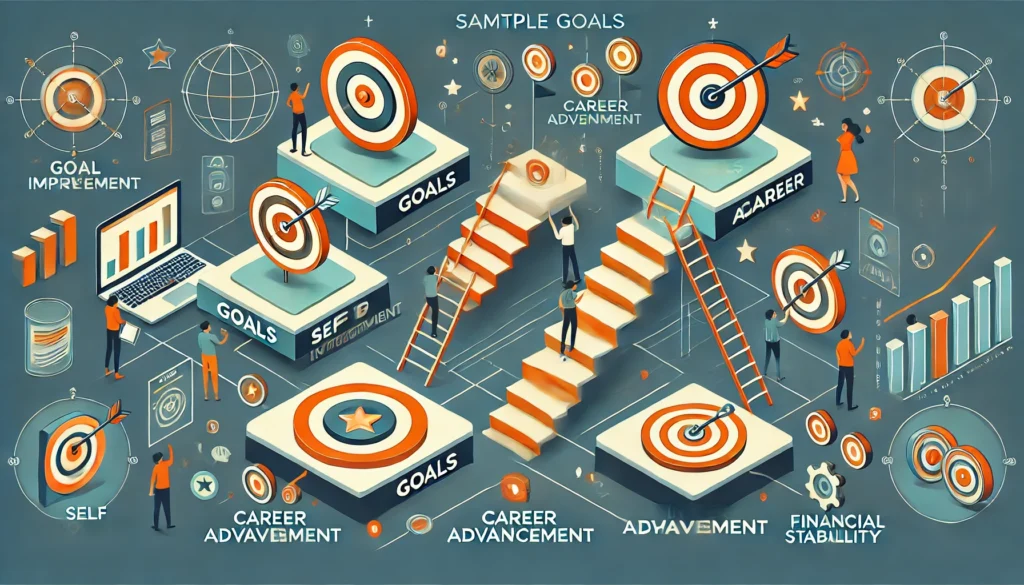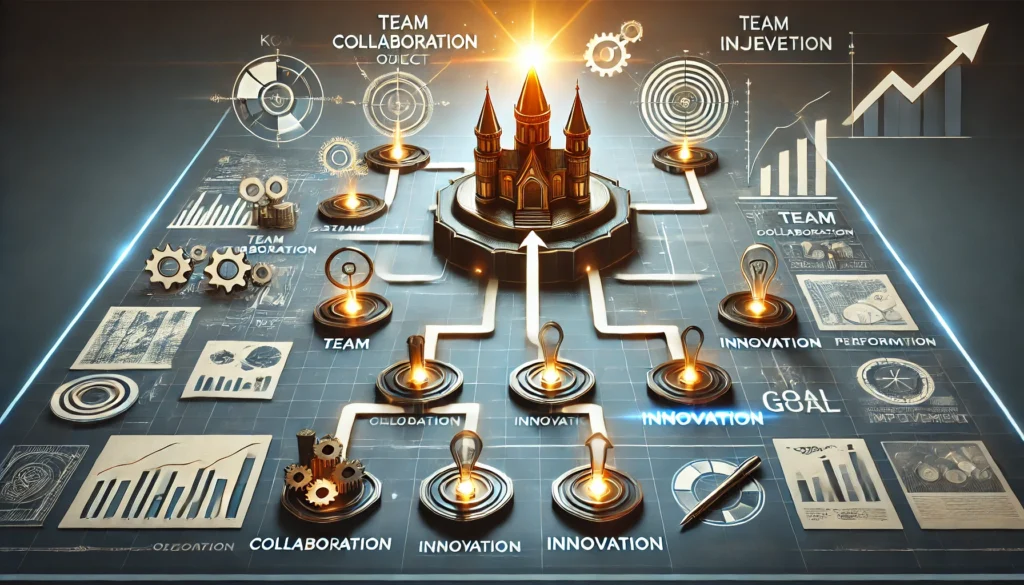Embarking on a journey of personal development is akin to setting sail towards a horizon full of potential and growth. It’s a voyage that combines introspection, planning, and action—a journey where the map is drawn with thoughtfully crafted goals and objectives. For those working in health and wellness, science journalism, or even the burgeoning field of biohacking, understanding how to develop these goals can be a transformative experience.
You may also like: How to Set and Reach Your Goals
Understanding the Importance of Goal Setting
Setting goals is not merely about ticking boxes; it’s about envisioning a future where your personal and professional aspirations align with your actions. This process is essential for anyone who wishes to achieve a sense of fulfillment and success. Goals act as a roadmap, guiding you through the complexities of personal development and ensuring you remain on track.
Historical Context of Goal Setting
The concept of goal setting is not a modern invention. It traces back to ancient civilizations, where leaders and philosophers emphasized the importance of self-improvement and strategic planning. The Greeks, for example, practiced goal setting as part of their philosophical pursuits, aiming for a balance between body and mind. Similarly, ancient Chinese culture valued long-term planning and personal growth as integral to success.
Today, goal setting is enriched by psychological theories and methodologies, making it a cornerstone of personal development practices. The evolution of this practice has been influenced by various psychological theories, such as Maslow’s Hierarchy of Needs, which emphasizes achieving self-actualization through structured goal setting.
Current Trends in Goal Planning
In the contemporary landscape, goal setting has evolved to become more personalized and adaptive. There’s a growing emphasis on creating goals that are Specific, Measurable, Achievable, Relevant, and Time-bound (SMART). This framework ensures that your goals are not only inspiring but also attainable. The SMART framework has been adopted globally across various industries, proving its versatility and effectiveness in goal setting.
Moreover, technological advancements have introduced digital tools that facilitate goal planning, offering features like progress tracking and motivational reminders. These tools help individuals stay focused and motivated, adapting to personal preferences and lifestyle needs. Additionally, there is an increasing trend towards setting goals that consider mental well-being and work-life balance, reflecting a holistic approach to personal development.
Psychological Benefits of Goal Setting
Goal setting is not just a practical tool; it has profound psychological benefits. Establishing clear goals can significantly boost motivation and self-confidence as individuals see themselves progressing towards their aspirations. The act of setting and achieving goals also fosters a sense of purpose, which is crucial for mental health and well-being.
Furthermore, the process of overcoming challenges to achieve set goals enhances resilience and problem-solving skills. It encourages a growth mindset, where individuals perceive challenges as opportunities for learning and development. This psychological shift can lead to increased satisfaction and happiness, reinforcing the importance of goal setting in personal development.
Sample Goals and Objectives for IT Employees
For IT employees, setting clear and measurable goals is crucial for professional growth and efficiency. Here are some examples:
Enhance Technical Skills
In the rapidly evolving tech industry, keeping skills updated is essential. Attending workshops and training sessions can help gain proficiency in emerging technologies like AI and machine learning. Continuous learning not only boosts technical competence but also opens doors to new career opportunities, keeping IT professionals competitive in the job market.
Participating in certification programs can further validate an individual’s expertise, providing a competitive edge. Engaging with online learning platforms offers flexibility and access to global experts, making skill enhancement more accessible than ever before.
Improve Communication Abilities
Effective communication is vital for IT professionals who need to convey complex technical concepts to non-technical stakeholders. Engaging in public speaking courses can significantly enhance one’s ability to present ideas clearly and confidently. This skill is crucial for collaboration within teams and for ensuring that technical initiatives align with broader business goals.
Regularly practicing presentations and seeking feedback from peers can help refine communication skills. Additionally, participating in cross-departmental projects can provide practical experience in explaining technical jargon in layman’s terms, further enhancing one’s communication prowess.
Increase Efficiency
Time management is a critical skill that can lead to optimized project delivery timelines and reduced work-related stress. Implementing time management techniques, such as the Pomodoro Technique or Eisenhower Box, can help IT employees prioritize tasks effectively. These strategies not only improve productivity but also contribute to a healthier work-life balance.
Moreover, leveraging project management tools like Trello or Asana can streamline workflow, ensuring that tasks are completed efficiently and deadlines are met. Regularly reviewing and adjusting time management practices can lead to continuous improvement in personal efficiency.
Goal Planning: A Strategic Approach
Goal planning requires a strategic approach that balances ambition with practicality. It’s about setting milestones that lead to the fulfillment of larger objectives.
Measurable Objectives and Their Importance
Measurable objectives are vital because they allow for the tracking of progress and provide a clear indication of when a goal has been achieved. For instance, an IT employee might set a measurable objective to reduce system downtime by 15% within a quarter. This specificity not only clarifies the goal but also motivates action towards achieving it.
Breaking down larger goals into smaller, measurable objectives can make the process less daunting and more achievable. It provides clear benchmarks for success, enabling individuals to celebrate small victories along the way. Regularly reviewing progress against these objectives can also inform necessary adjustments to strategies, ensuring continuous alignment with overarching goals.

Strategic Alignment with Organizational Goals
Aligning personal goals with organizational objectives can enhance career progression and job satisfaction. When employees’ personal development goals resonate with the company’s vision, it creates a synergy that benefits both parties. This alignment can lead to more significant contributions to the organization and increased recognition for the employee.
Collaborating with managers to set goals that align with departmental and organizational priorities can foster a sense of purpose and commitment. It encourages employees to take initiative and contribute to projects that are crucial to the organization’s success, enhancing both personal and professional growth.
Balancing Ambition with Realism
While ambition drives progress, it’s essential to balance it with realism to avoid burnout and frustration. Setting overly ambitious goals can lead to disappointment if they are not achieved, affecting motivation and morale. Therefore, it’s crucial to set realistic goals that challenge but do not overwhelm.
Regularly assessing personal capacity and resources can help in setting feasible goals. Seeking input from mentors or peers can provide valuable perspectives, ensuring that goals are ambitious yet attainable. This balance is key to sustaining motivation and achieving long-term success.
Sample Treatment Plan Goals and Objectives for ADHD Adults
Adults with ADHD often face unique challenges that require tailored goals to improve their daily functioning. Some sample goals include:
Improve Focus and Concentration
Utilizing cognitive-behavioral strategies can significantly enhance attention spans during work tasks. Techniques such as mindfulness meditation and structured routines can help individuals with ADHD maintain focus and manage distractions effectively. These strategies not only improve productivity but also enhance overall well-being.
Incorporating regular breaks and physical activity into the daily schedule can further support concentration and mental clarity. Experimenting with different techniques can help identify what works best for the individual, leading to a personalized approach to improving focus.
Enhance Organizational Skills
Developing a personalized scheduling system can help manage time more effectively and reduce missed appointments. Tools like digital calendars and reminder apps can assist in structuring daily activities and meeting deadlines. These organizational aids provide visual cues and prompts, making it easier to stay on track.
Breaking tasks into smaller, manageable steps can also enhance organizational skills, reducing overwhelm and increasing efficiency. Regularly reviewing and adjusting schedules can ensure that they remain effective and aligned with changing priorities.
Boost Emotional Regulation
Practicing mindfulness techniques can increase emotional awareness and resilience. Techniques such as deep breathing exercises and journaling can help individuals with ADHD manage stress and emotional responses more effectively. These practices promote a calm and centered state of mind, enhancing emotional well-being.
Engaging in regular therapy sessions or support groups can provide additional tools and support for managing emotions. Sharing experiences and learning from others can offer new perspectives and strategies for emotional regulation, fostering a sense of community and understanding.
Sample of Performance Goals and Objectives
Performance goals are integral to career advancement and personal development. They should be aligned with the individual’s role and the organization’s objectives.
Increase Sales Performance
Setting a target to increase sales by 20% over the next six months can be achieved by leveraging new marketing strategies. Identifying key customer segments and tailoring marketing efforts to their needs can significantly boost sales performance. Regularly analyzing sales data can provide insights into trends and opportunities, informing strategic adjustments.
Collaborating with the marketing team to develop innovative campaigns and promotions can also enhance sales efforts. Engaging in continuous learning about sales techniques and market trends can further support the achievement of sales goals.
Enhance Customer Satisfaction
Implementing feedback mechanisms can improve service delivery and achieve a customer satisfaction score of 90% or higher. Regularly collecting and analyzing customer feedback can identify areas for improvement, guiding efforts to enhance the customer experience. This proactive approach not only boosts satisfaction but also fosters customer loyalty.
Training staff in customer service excellence can further enhance interactions and resolve issues effectively. Encouraging a customer-centric culture within the organization ensures that all employees are committed to delivering exceptional service.
Develop Leadership Skills
Attending leadership training programs can prepare individuals for potential managerial roles in the future. These programs provide valuable insights into effective leadership styles and strategies, equipping individuals with the skills needed to lead teams successfully. Participating in mentorship programs can also offer guidance and support in developing leadership capabilities.
Taking on additional responsibilities and leading small projects can provide practical experience in leadership, building confidence and competence. Regularly seeking feedback from peers and mentors can inform personal growth and refinement of leadership skills.
The Role of Nootropics in Personal Development
Biohackers and wellness enthusiasts often explore the use of nootropics—supplements designed to enhance cognitive function—as part of their personal development plans. While the efficacy of these supplements varies, they represent a growing trend in the pursuit of mental optimization.
Future Implications of Biohacking Techniques
As biohacking continues to evolve, its implications for personal development are vast. Emerging research into brain science and nootropic supplements promises new avenues for enhancing mental and physical performance. These advancements could lead to personalized supplementation plans that optimize individual cognitive functions and overall health.
The ethical considerations surrounding biohacking and nootropic use are also gaining attention, as the line between enhancement and ethical practice becomes increasingly blurred. Ongoing discussions and research will shape the future of biohacking, influencing its role in personal development.
Integrating Nootropics with Lifestyle Practices
Integrating nootropics with lifestyle practices such as balanced nutrition, regular exercise, and adequate sleep can enhance their effectiveness. These lifestyle factors play a crucial role in supporting cognitive function and overall well-being. A holistic approach that combines nootropics with healthy habits can lead to more sustainable improvements in mental performance.
Consulting with healthcare professionals before incorporating nootropics into a personal development plan is essential to ensure safety and efficacy. Personalized advice can help individuals choose supplements that align with their goals and health needs, maximizing benefits while minimizing risks.

Crafting a Personal Development Plan
A well-crafted personal development plan is your blueprint for success. It should include a mix of long-term aspirations and short-term objectives, each contributing to your overall growth.
Balancing Scientific Facts with Practical Advice
Incorporating scientific insights into your personal development plan can enhance its effectiveness. Understanding the principles of behavioral psychology, for example, can inform strategies for habit formation and change. However, practical advice—such as maintaining a balanced diet, regular exercise, and adequate sleep—remains equally important.
Balancing scientific knowledge with practical application ensures that personal development efforts are grounded and achievable. Regularly reviewing and adjusting the plan based on progress and new insights can lead to continuous growth and improvement.
Setting Realistic and Achievable Milestones
Setting realistic and achievable milestones is crucial for maintaining motivation and momentum. Breaking down larger goals into smaller, manageable steps can make the journey less overwhelming and more rewarding. Celebrating achievements along the way reinforces positive behavior and encourages continued effort.
Regularly assessing progress against milestones can inform necessary adjustments and ensure alignment with overarching goals. This iterative process allows for flexibility and adaptation, enhancing the overall effectiveness of the personal development plan.
Leveraging Support Systems
Leveraging support systems such as mentors, peers, and professional networks can significantly enhance personal development efforts. These support systems provide valuable feedback, guidance, and encouragement, helping individuals navigate challenges and seize opportunities. Engaging with a community of like-minded individuals can also provide motivation and accountability.
Participating in workshops, seminars, and online forums can expand knowledge and perspectives, enriching the personal development journey. Actively seeking and nurturing supportive relationships ensures a robust foundation for growth and success.

conclusion
Whether you’re an IT professional, a health and wellness coach, or a biohacker, setting well-defined goals and objectives is crucial for personal and professional growth. By understanding the principles of goal planning and leveraging both scientific and practical insights, you can create a robust personal development plan that leads to sustained success.
In conclusion, the journey of personal development is deeply personal yet universally applicable. It’s about setting a course for a future where your ambitions are realized through strategic planning and dedicated effort. As you navigate this path, remember that your goals are your compass, guiding you toward a horizon filled with possibility and growth.
Further Reading:
The Difference Between Goals and Objectives (+Examples)
10 SMART goal examples for your whole life
10 Employee goal-setting examples to get your team on the road to success
Important Note: The information contained in this article is for general informational purposes only, and should not be construed as health or medical advice, nor is it intended to diagnose, prevent, treat, or cure any disease or health condition. Before embarking on any diet, fitness regimen, or program of nutritional supplementation, it is advisable to consult your healthcare professional in order to determine its safety and probable efficacy in terms of your individual state of health.
Regarding Nutritional Supplements Or Other Non-Prescription Health Products: If any nutritional supplements or other non-prescription health products are mentioned in the foregoing article, any claims or statements made about them have not been evaluated by the U.S. Food and Drug Administration, and such nutritional supplements or other health products are not intended to diagnose, treat, cure, or prevent any disease.


